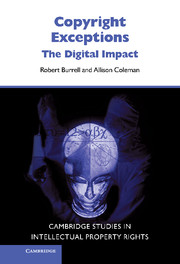Book contents
- Frontmatter
- Contents
- Preface
- List of abbreviations
- Table of cases
- Table of statutes
- Introduction
- Part I Where we are
- 1 Copyright and freedom of expression
- 2 Fair dealing for the purposes of criticism, review and news reporting and related exceptions
- 3 The public interest defence
- 4 Exceptions applying to education, research and private study
- 5 The library and archive provisions and related exceptions
- Part II How we got here
- Part III Where we go from here
- Appendices
- Copyright, Designs and Patents Act 1988, Part I, Chapter III: ‘Permitted Acts’
- Copyright, Designs and Patents Act 1988, s. 296ZE and Schedule 5A
- Directive 2001/29/EC of the European Parliament and of the Council of 22 May 2001 on the harmonisation of certain aspects of copyright and related rights in the information society
- United States Copyright Act 1976, 17 USC, s. 107
- Bibliography
- Index
- Cambridge Studies in Intellectual Property
3 - The public interest defence
Published online by Cambridge University Press: 04 March 2010
- Frontmatter
- Contents
- Preface
- List of abbreviations
- Table of cases
- Table of statutes
- Introduction
- Part I Where we are
- 1 Copyright and freedom of expression
- 2 Fair dealing for the purposes of criticism, review and news reporting and related exceptions
- 3 The public interest defence
- 4 Exceptions applying to education, research and private study
- 5 The library and archive provisions and related exceptions
- Part II How we got here
- Part III Where we go from here
- Appendices
- Copyright, Designs and Patents Act 1988, Part I, Chapter III: ‘Permitted Acts’
- Copyright, Designs and Patents Act 1988, s. 296ZE and Schedule 5A
- Directive 2001/29/EC of the European Parliament and of the Council of 22 May 2001 on the harmonisation of certain aspects of copyright and related rights in the information society
- United States Copyright Act 1976, 17 USC, s. 107
- Bibliography
- Index
- Cambridge Studies in Intellectual Property
Summary
In the last chapter it was seen that the statutory provisions relating to activities such as criticism, review and news reporting are inadequate to safeguard freedom of expression or freedom of information. It is therefore important to consider whether these provisions might be supplemented by a ‘common law’ public interest defence, that is, a defence sitting outwith the statutory regime that would justify the publication of copyright material in certain circumstances. This question is complicated by the fact that two recent Court of Appeal cases reached different conclusions as to whether a public interest defence to actions for infringement of copyright exists at all in the United Kingdom, and even the case that accepted that such a defence does exist indicated that its scope is more limited than earlier authorities had seemed to suggest.
This chapter begins by considering the scope of this defence as it had apparently been established prior to the recent decisions of the Court of Appeal. Our aim in this section is to demonstrate that whilst these earlier authorities indicated (quite rightly) that the public interest defence is relatively limited in scope, in its early form the public interest defence added a degree of flexibility to the statutory scheme. In particular, in its early form the public interest defence provided an important additional safeguard in cases where the user was seeking to place evidence contained in an unpublished work into the public domain.
- Type
- Chapter
- Information
- Copyright ExceptionsThe Digital Impact, pp. 80 - 112Publisher: Cambridge University PressPrint publication year: 2005

